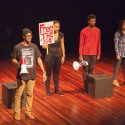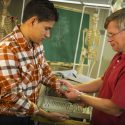Canceled: Film documents African American experience on campus
Update: Due to editing complications and time constraints during finals week, this screening has been canceled. Look for it to premiere next fall semester.
A student-produced documentary film, “Like Touching A Hot Stove,” which provides a window into student life for African Americans at the UW–Madison, is set to premiere on Tuesday, May 12.
The film will be shown at 5:30 p.m. in the Multicultural Student Center Lounge, located on the second floor of the Armory and Gymnasium (Red Gym), 716 Langdon St. The screening is free and open to the public.
The documentary was filmed and produced on campus by Martinez White, a junior studying communication arts and Afro-American studies.
The film discusses a range of challenges faced by minority students on campus, including feelings of isolation and being uprooted from their home communities. The perceived expectations of college life are often far from the reality once the students arrive on campus.
“The small things are making them feel excluded as students on campus,” says White. “For some students, it has made them perform academically at a lower standard, because on the inside they don’t feel like this is the place for them. So they’re feeling like they’re out here by themselves.”
“Like Touching A Hot Stove” features candid interviews from students of different racial and ethnic backgrounds, as well as university staff and faculty members who confront these issues on a daily basis. The film includes interviews with Lori Berquam, dean of students; Michael Thornton, director of the Morgridge Center for Public Service; Damon Williams, vice provost for diversity and climate; and Craig Werner, chair of the Department of Afro-American Studies.
To complete the film, White received a grant from the Kauffman Entrepreneurship Community Internship Program.
“The documentary is to continue to explore these experiences of students and then take that and tell it to administrators and professors,” says White, “to go to them and say ‘this is what students are saying,’ the good and the bad about the university. How do you feel about it, or what are we doing as an institution to make some forward steps towards making this a more inclusive environment? Or, what have we done where we’ve made some steps and progress?”
Tags: arts, business, diversity, entrepreneurship, events, student life



